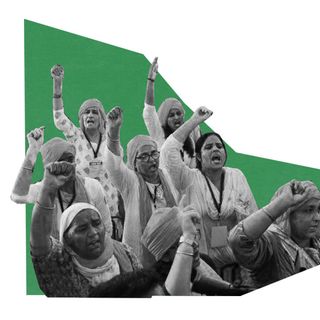At least 3,000 state government hospital nurses in Kolkata staged a protest on Monday demanding an end to pay disparity between themselves and other government employees with similar qualifications. The protest took place near SSKM hospital, where nurses are staging a sit-in since July 26th over the differences in pay scale.
“Nurses in the government sector have been putting up with pay discrimination for years. A nurse with a diploma should be entitled to Level-12 pay but they get Level-9 pay,” Bhaswati Mukherjee, the secretary of Nurses Unity, a nursing association, told The Telegraph.
Levels 9 and 12 refer to the pay scale afforded to government employees across a range of services. The nurses alleged that engineering diploma holders, also on Level-12 grade, are paid more than nurses across all categories. The Kolkata nursing associations staged a protest in 2019 over similar concerns. Though the government promised to address their grievances, nothing was done, according to the protestors.
“Nurses across all categories – diploma-holder, BSc-degree holder, experienced, fresher – get less than what they should be entitled to,” Mukherjee added.
This time, the protest comes in the backdrop of rising Covid19 cases, a lag in vaccination drive, and reports of a third wave of the pandemic — which experts say is set to begin in August. The concerns of nurses are not new: since the pandemic began last year, nurses from different states have protested inadequate pay and low safety while working in high-risk environments.
The present protest is echoed across the country, where nurse unions oppose governments’ tokenistic appreciation of nurses as “corona warriors” without adequately compensating them or providing job and workplace securities.
Related on The Swaddle:
The Govt Will Give Medals To Doctors, Nurses On Covid Duty. There Are Better Ways to Thank Them
Last month, more than 1,500 government nurses in Telangana staged protests over non-payment of salaries and abrupt termination. About 1,300 nurses in Maharashtra also protested for greater job security and a Covid19 allowance earlier this year. More than 5,000 Nurses from the All India Institute of Medical Sciences (AIIMS) also protested unsafe working conditions, overwork, and underpayment of stipulated salaries last year, only to be met with a court order restraining them from further protest.
Further, slow recruitment of nurses, contractual job offers, and slashing of health budgets during the pandemic have all led to nurses being overworked and exhausted during the pandemic. The protests spotlight a lack of priority given to nurses as essential healthcare workers in India.
The disparity in payment also speaks to the gendering of the healthcare sector, where nursing, despite being a high-skill job, is stigmatized and offers low pay. Women overrepresented in nursing and care work also mean that they are paid less, and that the profession is not associated with as much respectability as doctors and physicians.
Importantly, both gender and caste contribute to the “devaluation” of nursing in India, since the profession involves corporeal labor which deals with bodily fluids, Panchali Ray, an independent researcher, told The Hindu.
As a result, nurses have long protested their unequal treatment in terms of payment, security, and respect as compared to doctors. The difference has been heightened during the pandemic.
“Doctors come once a day. It is the nurses who monitor patients throughout the day. Nurses have to be present inside Covid wards for much longer duration than doctors. We are not demanding any favor. We are just asking for the right compensation for our services,” another nurse from the Kolkata protest told The Telegraph.




